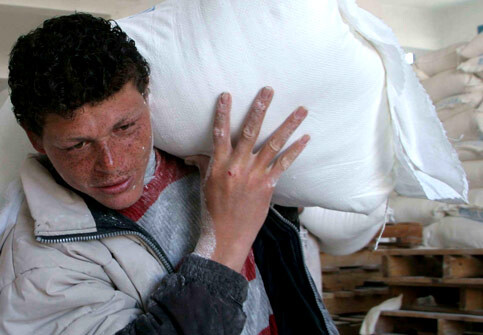Oxfam International 13 April 2007

A Palestinian receives aid from the United Nations Development Programme in Gaza, 5 March 2007. (Hatem Omar/MaanImages)
A survey commissioned by international development agency Oxfam International and released today, highlights how the suspension of Western aid and Israel’s refusal to transfer money owed to the Palestinian Authority (PA) has led to grave humanitarian consequences for Palestinians.
The survey by the Palestinian Centre for Public Opinion (PCPO) found that more than four out of five of the 677 families interviewed have seen a drop in their income following the year long boycott of the Palestinian Authority. Half of all the families reported losing more than half their income.
The PCPO also interviewed 67 senior managers running schools, hospitals and water services across the West Bank and Gaza. Nine out of ten managers said that services had been negatively affected by this boycott. Half of the essential service managers reported that they have cut their vital services by 50 per cent or more because of insufficient funding.
Palestinians had already been struggling to make ends meet when key Western donors including the US, EU and Canada suspended direct aid to the Palestinian government in April 2006. The move came in response to the victory of Hamas in parliamentary elections. Israel halted tax and customs revenue transfers it owed to the PA shortly afterwards.
Western donors argued that their goal was to change the policies of the Hamas-led government, not to punish the Palestinian people. However, Oxfam’s survey shows that the financial boycott has had a devastating impact on civilians.
“International aid should be provided impartially on the basis of need,not as a political tool to change the policies of a government,” said Oxfam International Executive Director Jeremy Hobbs. “Oxfam opposes violence against civilians and supports Israel’s right to exist alongside a viable and independent Palestinian state. But suspending aid - and withholding tax revenue in violation of international agreements - is not an ethical or effective way to achieve these outcomes. And in this case, it hasn’t worked. Instead, parents have been driven into debt, children taken out of classrooms and whole families deprived of access to medicine and healthcare,” added Hobbs.
The best efforts of the European Union to continue helping Palestinians civilians by making direct payments to many government workers and welfarerecipients, has failed to prevent spiralling poverty which has increased by 30 per cent in 2006 according to the UN.
“Europe’s foreign ministers should not miss the opportunity of their forthcoming meeting to restore the faith of Palestinians in the European Union,” Hobbs added. “Despite welcoming the National Unity Government, the European Union has failed to restore aid payments. With Palestinian institutions collapsing and insecurity growing, the resumption of international aid to the Palestinian Authority is a necessary step to preventing further suffering and securing a just and lasting settlement on the basis of international law,” Hobbs said.
Related Links